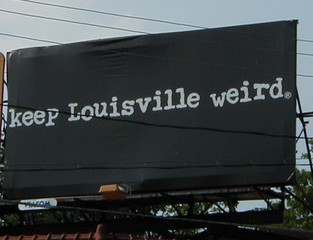Is Independent Retail Really That Strange?

Billboard in local "Keep Louisville Weird" campaign.

Independent retail is part of what makes communities unique. It also builds the local economy. It's also seriously on the decline with the increased presence of national and international retailers and property owner/developers in most markets across the United States. Such is the result from having a "mass market" rather than myriads of local markets across the country. And for many decades, the U.S. being the only mass market with real mass world-wide gave U.S. manufacturers tremendous competitive advantage.
The economies of scale that come from the mass market also exert great pressures on retail companies to reposition their businesses as national companies. We lament the decline of department stores, particularly because those stores have been associated with our memories (if we are of a certain age) of growing up, and making special trips to the main store. For me it was J.L. Hudson's in Detroit, but I also appreciated independent company Crowley, Milner & Company, and even the local department store in Pontiac Michigan, Lion.
The Federated-May merger discussed in other entries is about recognizing the power of national brands like "Macy's" and "Bloomingdales" and leveraging the brand across the country by taking the once local stores and converting them into Macy's branches. While it makes money for Federated, it does lead to store closings often in urban settings, people losing their jobs, less money spent locally, including a reduction in the amount of advertising spent locally, which contributes to a reduction in quality of local newspapers and television (as if local tv news could get any worse).
This process has been going on for some time at the local level (for example, Jordan Marsh Florida and Maas Brothers stores were combined into Burdines; Hecht's acquired Thalhimer, Woodward & Lothrop, and Miller and Rhoads stores into Hecht's, etc.). Until the Macy's plan was instituted by Federated, Dillards was the only company that acquired local department store chains and converted them into Dillards branches. Based mostly in the south, Dillards advertises in magazines such as Southern Living. The Baltimore Sun discusses this in the story "Marking a crossroads for department stores: Reflagged Macy's looks to emerge as stronger competitor in retail jungle."
The American Independent Business Alliance is a national independent business promotion organization that developed out of the Boulder Independent Business Alliance. Somewhere along the way, they decided to adopt and adapt the language of the "Keep Austin Weird" campaign, which was devised to herald Austin's uniqueness in the face of Texas' cowboy culture. (The Business Alliance for Local Living Economies is another organization devoted to strengthening local businesses and local economies. So is Co-Op America.)
Richard Linklater's movie "Slacker" celebrates this culture. The Austin community organization Liveable City stresses the importance of local retail vs. national chains in their efforts to support local bookstores rather than chains like Borders (a great company that started in Ann Arbor, but a chain now nonetheless) and commissioned a study that demonstrated the greater positive economic impact that comes from local businesses.
Although I think that the "Keep Louisville Weird" campaign is impressive, and offers a lot of ideas for promoting local businesses, I think that it would make more sense to put the focus on independent businesses as unique, home-grown, based in the community, providing leadership providing financial support to local organizations, etc., rather than thinking of independent businesses as "weird."
(Retail consultant Jon Schallert specializes in helping retail businesses and districts in becoming special, differentiated destinations with competitive advantage. I tried to get him for a seminar in DC, but I wasn't able to pull it off. )
What we ought to be promoting is quality, independent, destination retail that contributes in a variety of positive ways to livable communities, including building local economies.
What's weird about that?
___________________
Two nice stories about quality independent businesses from the Richmond Times-Dispatch on an upscale cafe inside a convenience store-gas station in rural Powhatan County and an independent hardware store in Arlington County. (You'll probably have to register for access to these stories.)



0 Comments:
Post a Comment
<< Home